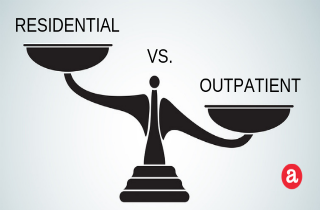What are the main differences or similarities between residential alcohol rehab programs vs. outpatient programs? What program is more effective for you? Read more here so that you can make an informed decision. Then, we invite your questions about rehab programs at the bottom of the page. We try to respond to all questions personally and promptly.
Main differences between residential and outpatient
1. Cost
Outpatient alcohol rehab programs cost less than their inpatient counterparts. On average, an outpatient program is in the $2-5K range while residential rehabs start at $7,5K per month, whereas high-end luxury programs can cost as much as $120K per month. A good amount of evidence-based, high-quality residential rehabs exist in the $18K to $35K per month range.
2. Residence
The main difference here is that while food and housing is provided in a residential setting, you attend outpatient alcohol rehab while living at home (and possibly working).
People who attend outpatient rehab programs can continue to function relatively normally and maintain employment as well as family and social relationships. Compared with inpatient programs, those patients in outpatient treatment retain greater freedom, continue to work and maintain day-to-day activities with fewer disruptions, and incur fewer treatment related costs.
3. Duration
Alcohol rehab programs last for different periods of time based on the treatment program and individuals’ needs. Short term residential programs last from 30-60 days. Longer-term residential treatment has lengths of stay that can be as long as six to twelve months. These programs focus on helping individuals change their behaviors in a highly structured setting.
In comparison, outpatient rehab programs last, on average, for about 10 weeks. Programs exist in the 2 month – one year range, as well.
Similarities between residential and outpatient alcohol rehab programs
The main similarity between addiction treatment programs is that the person needs to have ALCOHOL OUT OF THE SYSTEM before treatment begins. The process of detoxification in either setting initially involves the assessment and treatment of acute withdrawal symptoms, which may range from mild (tremor and insomnia) to severe (autonomic hyperactivity, seizures, and delirium).
Additional similarities in both residential alcohol rehab and outpatient rehab may include:
- attendance at Alcoholics Anonymous meetings
- connection to social services
- education on the nature of addiction
- psychological and behavioral counseling
- medical consultations
- recreational and social activities
Effectiveness of residential vs outpatient alcohol rehab programs
The respective advantages and disadvantages of inpatient and outpatient rehabs may make one setting more appropriate than the other for a particular person, but treatment setting does not generally appear to influence overall treatment outcome. In other words, neither residential nor outpatient alcohol rehab seem to be most effective. A number of questions remain unanswered concerning how to determine when a particular setting will be advantageous for a patient. However, personal motivation and willingness to change are key indicators that influence treatment outcomes most.
Advantages of outpatient alcohol detox
For patients with mild-to-moderate alcohol withdrawal syndrome, outpatient detoxification is as safe and effective as inpatient detoxification but is much less expensive and less time consuming. In addition, patients who enroll in long-term outpatient rehabilitation treatment following detoxification in an outpatient setting may benefit by attending the same treatment facility for both phases of treatment.
Disadvantages of outpatient alcohol detox
Most alcohol treatment programs find that fewer than 10% of patients experiencing alcohol withdrawal symptoms require check in to an inpatient clinic. However, outpatient detox is not appropriate for all patients; it is not safe for alcoholics at risk for potentially life-threatening complications of withdrawal, such as delirium tremens, or those with associated medical conditions such as pancreatitis, gastrointestinal bleeding, or cirrhosis. In addition, outpatient detoxification is not appropriate for suicidal or homicidal patients, those with severe or medically complicated alcohol withdrawal, patients in adverse or disruptive family or job situations, or patients who would not be able to travel daily to the treatment facility.
Among another of the drawbacks associated with outpatient detoxification is the increased risk of relapse resulting from easy access to alcoholic beverages. In addition, outpatients can more easily choose not to keep their detoxification appointments and, consequently, fail to complete detoxification.
Advantages of residential alcohol detox
Inpatient settings offer the advantages of constant medical care and supervision provided by a professional staff and the easy availability of treatment for serious complications. In addition, such settings prevent access to alcohol and offer separation from the drinking environment.
Disadvantages of residential alcohol detox
The primary disadvantage of residential alcohol rehabilitation is its relatively higher cost compared with outpatient alternatives. In addition, inpatient care may relieve patients of personal responsibilities and encourage unnecessary dependence on hospital staff.
Residential alcohol rehab programs vs. outpatient questions
Have you already chosen a rehab program or are you still looking? Wondering what services alcohol rehab programs include? We welcome your questions and comments in the section below. And we will try our best to provide answers or refer you to experts that can.









Related Posts